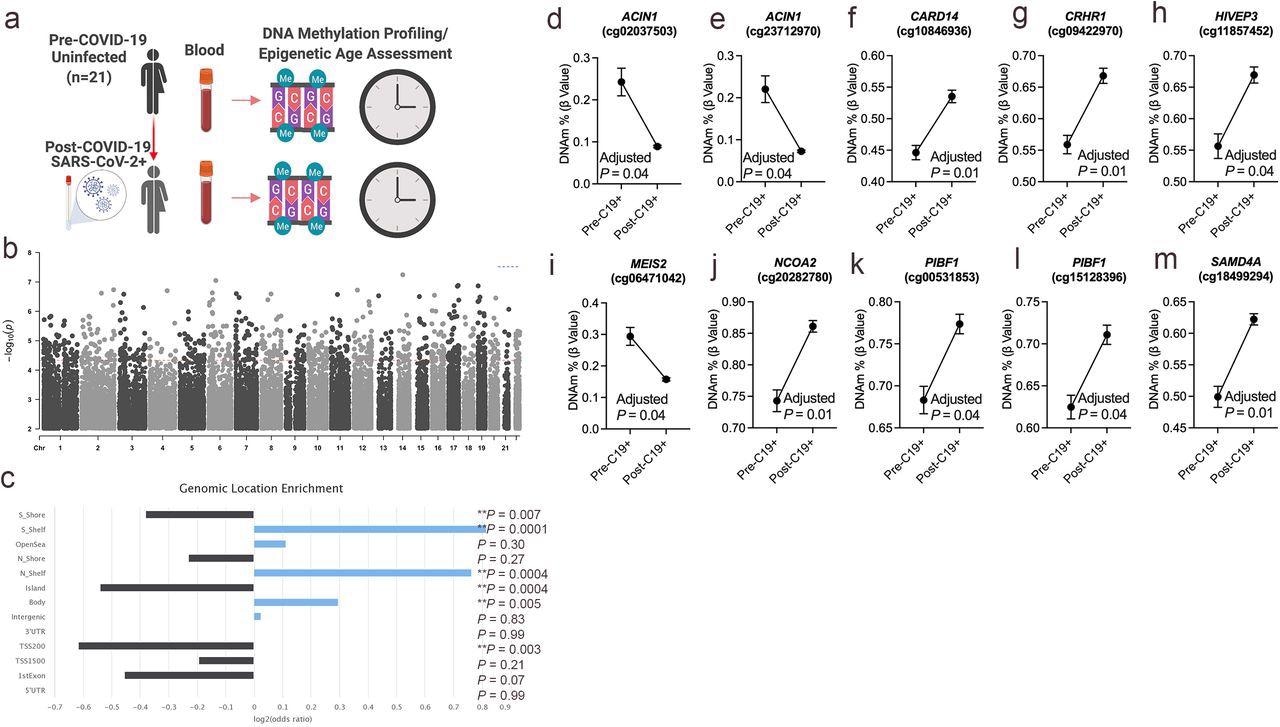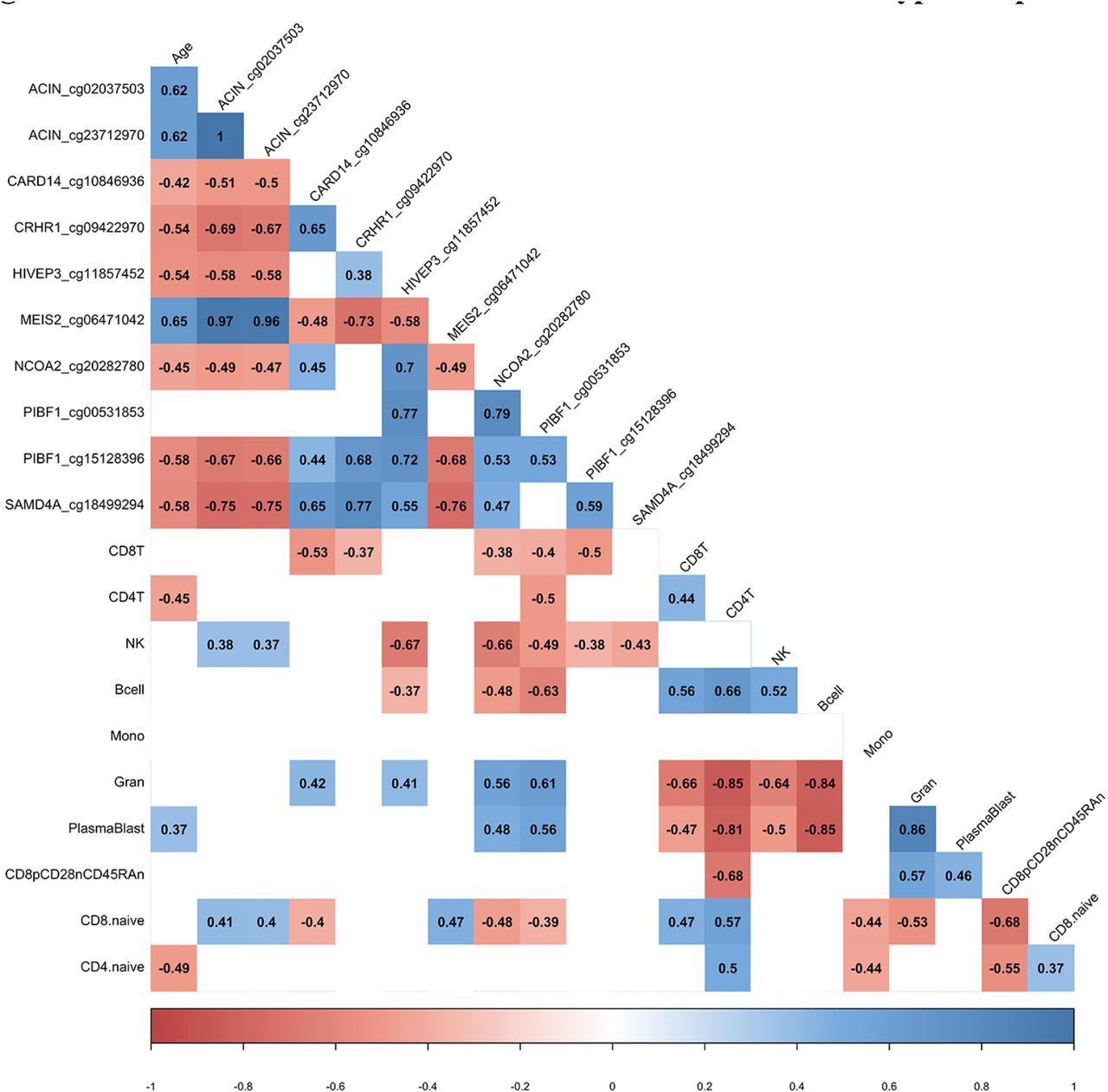Epigenetic clocks have potential as biomarkers of COVID-19 vaccine responses
Epigenetic mechanisms, such as DNA methylation, are crucial for both host immune responses to the severe acute respiratory syndrome coronavirus 2 (SARS-CoV-2) infection and for pathogenesis and severity. Past studies have shown that SARS-CoV-2 infection alters the transcriptional landscape in severe coronavirus disease 2019 (COVID-19). However, insights into host DNA methylation states and longitudinal assessments of epigenetic clocks prior to and following COVID-19 are limited. Epigenetic clocks are distinct DNA methylation patterns used to derive epigenetic measures of biological aging.

Study: Longitudinal study of DNA methylation and epigenetic clocks prior to and following test-confirmed COVID-19 and mRNA vaccination. Image Credit: Corona Borealis Studio/Shutterstock
In the absence of longitudinal epigenetic studies on COVID-19, it remains unclear whether all the aforementioned alterations in DNA methylation also occur in healthy individuals that recover from non-hospitalized COVID-19. Furthermore, it also remains unknown how these epigenetic mechanisms are impacted in individuals after they have received mRNA vaccination against COVID-19.
Study design
In a recent work posted to the medRxiv* pre-print server, a team of researchers performed longitudinal epigenetic studies on blood samples from individuals who had recovered from COVID-19. They investigated the alterations in the DNA methylation states, immune cell-type composition, and epigenetic clocks.
They examined longitudinal DNA methylation changes in the blood of 21 healthy participants before and following test-confirmed mild/moderate COVID-19 at a median timeframe of 8.35 weeks. Next, they analyzed longitudinal DNA methylation states, blood immune cell-type composition, and epigenetic clocks of 36 healthy participants before and after receiving two doses of mRNA-based COVID-19 vaccination.
Key findings
Aberrant DNA methylation related to immune dysfunction is often due to SARS-CoV-2 infection, and several past studies have reported such distinct blood-based DNA methylation as a potential biomarker of COVID-19. On observing blood-based DNA methylation changes associated with COVID-19 exposure in healthy participants, 261 differentially methylated, cytosine-guanine nucleotides linked by phosphate (CpGs), were identified at a false discovery rate (FDR) adjusted P-value < 0.05. The FDR is a statistical approach typically used in high-throughput experiments to correct random events that falsely appear significant. Hypermethylation at this locis was related to the caspase recruitment domain family member 14 (CARD14) gene, which encodes a protein interacting with B-cell lymphoma 10 (BCL10). BCL10 functions as a positive regulator of cell apoptosis.
The percentage change in DNA methylation following COVID-19 exposure indicates that a subset of DNA methylation changes related to COVID-19 exposure occurred due to cell-type compositional changes.

Notably, the differentially methylated CpGs associated with COVID-19 were enriched in transcriptional gene sets identified from published SARS-CoV-2 human, animal model, and in vitro infection studies. These findings suggested that these DNA methylation changes associated with COVID-19 also regulate and modulate the host's gene expression from infection. Together, these findings support the notion that distinct host DNA methylation states in circulating immune cells serve as a COVID-19 specific epigenetic signature. However, the durability of this COVID-19 epigenetic signature remains unclear and needs to be investigated in future studies.

Unlike in the case of natural SARS-CoV-2 infection, epigenetic clocks significantly changed following Pfizer and Moderna mRNA vaccination against COVID-19 in individuals who were 50 years or older. The results revealed that principal component-based epigenetic clock estimates of PhenoAge and GrimAge significantly increased in people aged 50 years or older following infection by an average of 2.1 and 0.84 years. In contrast, PCPhenoAge significantly decreased in people 50 years or younger after infection by an average of 2.06 years. This observed divergence in individuals of different age bands suggests that epigenetic clock estimates pre- and post-COVID-19 vaccination was related to compositional changes in immune cells, such as B cells and plasmablasts, highlighting the potential utility of epigenetic clocks in capturing vaccine responses.
Conclusion
The study findings have important implications for research into the impact of COVID-19 and the mRNA vaccination on epigenetic aging in the immune system. Future research studies will examine whether COVID-19 and mRNA vaccine-related changes impacting the epigenetic age are biologically meaningful. In addition, they will have to establish the significance and durability of short-term changes in epigenetic aging. In the future, epigenetic clocks may serve as a potential biomarker of COVID-19 vaccine responses and track the need for booster shots due to waning COVID-19 immunity in older individuals.
*Important notice
medRxiv publishes preliminary scientific reports that are not peer-reviewed and, therefore, should not be regarded as conclusive, guide clinical practice/health-related behavior, or treated as established information.
- Alina PS Pang, et al. 2021. Longitudinal study of DNA methylation and epigenetic clocks prior to and following test-confirmed COVID-19 and mRNA vaccination. medRxiv. 2021. doi: https://doi.org/10.1101/2021.12.01.21266670 https://www.medrxiv.org/content/10.1101/2021.12.01.21266670v1
Posted in: Medical Science News | Medical Research News | Disease/Infection News
Tags: Aging, Animal Model, Apoptosis, Biomarker, Blood, Cell, Coronavirus, Coronavirus Disease COVID-19, Cytosine, DNA, DNA Methylation, Gene, Gene Expression, Guanine, Immune System, immunity, in vitro, Lymphoma, Nucleotides, Protein, Research, Respiratory, SARS, SARS-CoV-2, Severe Acute Respiratory, Severe Acute Respiratory Syndrome, Syndrome, Vaccine

Written by
Neha Mathur
Neha Mathur has a Master’s degree in Biotechnology and extensive experience in digital marketing. She is passionate about reading and music. When she is not working, Neha likes to cook and travel.
Source: Read Full Article
